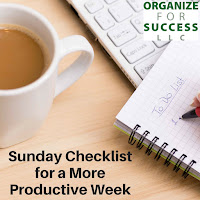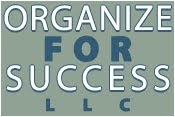1. Write down your goals for the week. Our brains are meant for thinking, not remembering; therefore, it's important to document what you need to recall later. Determining your priority tasks and listing them out enables you to know what needs to be achieved, set deadlines and be more likely to get things done. If you've already completed your Weekly Strategy Session, you have a game plan, but, if not, at the very least, take time to list out your goals for priority tasks to complete in the week ahead.
2. Create a blank slate for completing your priorities. Return to their homes the items atop your desk that you have been using for work. Put away the papers and objects in your "to file" stack. Move into folders the random selection of documents downloaded to your computer's desktop. Return your email to the desired "inbox zero" status (or as close as possible). Clear your clutter!
3. Get a head start on your marketing tactics for this week. Can you draft, edit or add photos to what blog posts will go live? Can you schedule some of the content to be posted on your social media channels? If you have networking events to attend, can you check out the registration lists to see with whom you need to connect? Have you or your team placed what advertising buys are needed? Take action now to double-check what's up so you don't worry later about what might've fallen through the cracks.
4. Plan from where your meals will come. We each need to eat regularly to stay alive, but waiting until we're hungry to figure out what we'll eat can be a recipe for poor eating. Instead, take time to plan your meals, incorporating options for using a slow-cooker, cooking mass amounts over the weekend for meals throughout the week, ways in which the same elements can be reused in different ways and pre-packing lunches. Assuming you eat 3 meals each day, there are 21 opportunities for creatively streamlining.
5. Lay out each day's outfit for the week ahead. Check the forecast and pick out each detail of what will be necessary so you aren't scrambling in the morning. This should include what purse to carry, what jewelry to wear and what undergarments are needed. Plus, I find this is an excellent opportunity to make sure everything in my closet is hung or in the basket where it is supposed to be; an organized closet makes it so much easier to find what's needed for that perfect outfit you'll need at this week's big presentation.
6. Connect with those who matter. Outreach on social media to share content that might be of value to a friend, congratulate someone for a big accomplishment from the week ending or say hey to a contact you've been missing. Better yet, get together in-person or via video chat with someone who is special to you; spending time with people who know or love you will fuel your soul and re-enforce your identity. Then, talk through logistics with your family; since we all wear many hats, working through commitments with your spouse, kids or roommates will make sure folks get where they need to go with what is needed while managing how much stress is experienced. We don't want preschool calling in a panic because someone got left behind, right?
7. Wash and change your bed sheets as well as your bath towel. I recently saw someone post about the pure joy she felt when jumping into bed on Sunday with clean sheets so that's becoming my new habit, rather than washing them on Saturday or another night of the week. Such an excellent idea!
What steps do you take over the weekend to prepare for the week ahead? Will you be starting any of those listed above? What tactic do you find most helpful in being proactive?







